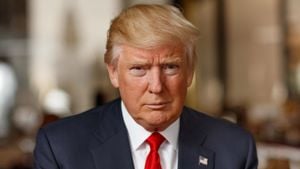With Donald Trump back at the helm of the White House, the international community is holding its breath, particularly as it pertains to U.S.-Russia relations. While Trump and his policies had been polarizing during his first term, his re-election poses renewed questions about how future diplomacy and international alliances will evolve. Many observers believe Moscow is cautiously optimistic about how Trump's presidency might reshape geopolitical dynamics.
The Kremlin’s immediate reaction to Trump’s victory has been muted. A guarded indifference hints at high expectations behind closed doors. According to Ian Hill at the Lowy Institute, the election results signify more than just another change of guard; they serve as proof of America’s increasing internal division. Moscow has adeptly recognized the political discord within the U.S. as beneficial to its interests, seeing it as part of its strategy to diminish the West’s cohesion.
Historically, Trump has had mixed results when it came to U.S. relations with Russia. While he expressed desires to thaw tensions during his first term, his administration also implemented heavy sanctions targeting Moscow. Factors influencing the sanctions included pressure from Congress and the demands of national security leaders rather than Trump's own foreign policy inclinations. This may have brought distress to the Kremlin, as unpredictability is not precisely what they wish from their Western counterpart. Now, observers speculate if Trump’s unpredictability might morph from whimsical to strategic.
The influence of disinformation campaigns leading up to the election can’t be ignored. Reports indicate these efforts stoked divisions and provoked social discord, which feeds directly to the Kremlin's narrative of triumph over perceived American weakness. Trump’s victory validates the Kremlin’s chaos assertion, providing them with something of a propaganda win on the global stage.
On the international front, analysts anticipate turmoil as Trump’s skepticism of alliances could deepen divides within NATO. His transactional style, which often requests allies to raise their defense spending, may produce friction among allied nations who rely on America’s support. The question remains: will these strains open up avenues for Russia to assert its influence more freely, particularly as it relates to issues like Ukraine?
Examining the situation closer to home, the Kremlin is acutely aware of Ukraine’s precarious position. Trump has publicly claimed he could end the war within 24 hours. Yet, specifics about how this would be accomplished are shrouded in mystery, leaving many Ukrainians skeptical. There's concern within Kyiv, as any negotiated terms would likely favor Russian interests — something Ukrainians are wary of, especially after years of conflict.
While Trump is expected to be largely indifferent toward Ukraine’s security needs, Putin might interpret Trump’s return as permission to leverage his position and demand full control of Ukrainian territories already annexed. This situation, according to Hill, could threaten Ukraine's sovereignty and hinder its aspirations for NATO membership.
Moscow is gearing up for resurgence across the battlefield, particularly as the biting winter approaches. With Ukraine's energy infrastructure dwindling due to consistent bombardments, Russia aims to establish dominance before Trump takes office. Such tactics will not only embolden Moscow's military strategies but also consolidate its hold over eastern Ukraine, complicative to existing geopolitical dialogues.
Turning to the Middle East, the anticipated Trump administration may offer mixed signals. Despite strained relations between Trump and Israeli Prime Minister Benjamin Netanyahu, the Trump administration’s foundational support for Israel could create openings for Russia to deepen its alliances with Middle Eastern nations, such as Saudi Arabia and Gulf states. Managing these relationships will be delicate since conflicts with Iran could pit the region against one another with potential ramifications for broader American foreign policy.
Regarding Iran, Trump’s expected hardline stance on its nuclear ambitions may not sit well with every party involved. This dynamic poses risks for international relations, as Tehran might deepen its reliance on Russia and China. Although Russia has shared concerns about Iran’s nuclear ambitions, they aren't prepared to take unilateral steps if Trump escalates tensions.
Meanwhile, the North Korean question looms large. An emboldened Trump might pose challenges for Moscow, as Trump’s confrontational posture could inflame tensions and lead to unintended consequences for both nations.
Significantly, the potential deterioration of U.S.-China relations under Trump's watch could offer Russia new opportunities. Deepening Russian ties to China could wield considerable influence, especially amid shifting global power dynamics. Yet, Moscow has to navigate carefully to prevent being cornered by its newfound dependency on China.
Nevertheless, the Kremlin isn't without concern. Should Trump revive American energy output, it could drive global oil prices down, negatively impacting Russian finances. Yet, analysts argue these economic risks are manageable when weighed against broader disruptions to the U.S.-led international order. Russia is likely to foresee the U.S. moving back to isolationism under Trump's leadership, seeing this as a chance to fortify its position on the global stage.
Given the polarized nature of U.S. society and its political ramblings, the Kremlin might be encouraged by Trump’s return to push its agenda forward, hoping he could inadvertently support a more chaotic global political climate. Washington’s image as the moral compass of the West feels increasingly strained, leaving spaces for adversarial nations like Russia and China to grasp opportunities.
Nonetheless, experts are unequivocal about one thing: the root causes of U.S.-Russia tension won’t simply vanish. America’s complex relationship with Russia is deeply entrenched, shaped by history, ideology, and conflicting interests. The transformative potential of Trump's presidency may alter diplomatic approaches but is unlikely to eradicate the fundamental confrontations deeply embedded within.
We're entering uncharted waters with Trump’s return to power, and how this will influence, reshape, or exacerbate international relations—particularly with nations like Russia—remains to be seen, solidifying suspicions about the resilience of old rivalries and the unpredictability of new leadership.



